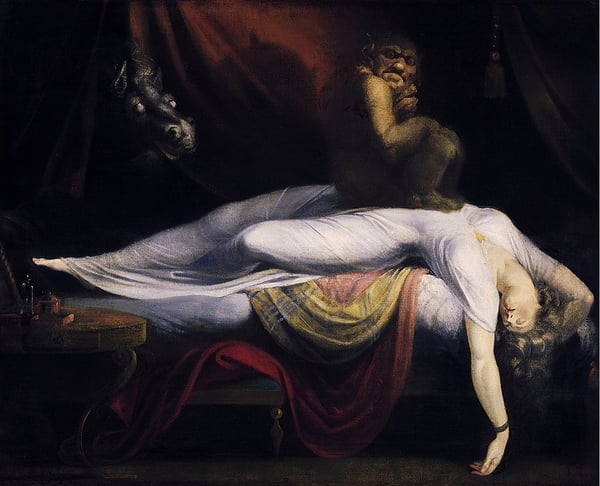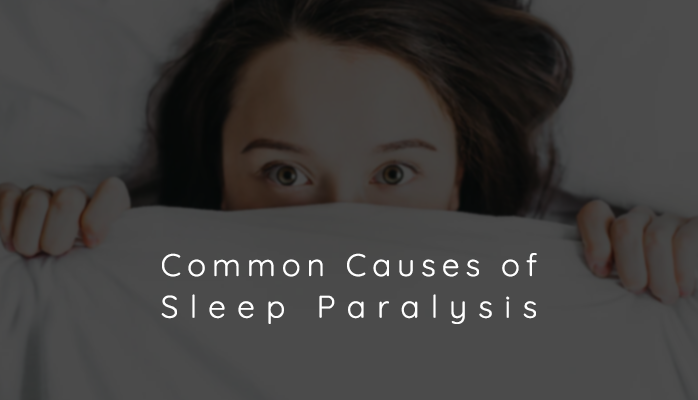What is Sleep Paralysis?
Sleep paralysis is being unable to move or speak during the transition between wakefulness and sleep. Sleep paralysis occurs either right after you wake up, or right before you fall asleep. It is result of your body not smoothly transitioning between stages of wakefulness and sleep. And it can be mildly disconcerting to terrifying, especially if you are unaware what sleep paralysis is.
When sleep paralysis strikes, you will be unable to move your body, except for your eyes, and unable to speak. It can last only a few seconds or for a couple of minutes, which can be terrifying. Although uncommon, people also report sleep paralysis lasting even longer than two minutes.
Different Causes of Sleep Paralysis
The feeling of sleep paralysis is one of total helplessness. They can be very terrifying. In fact, in the past it was commonly thought that sleep paralysis resulted from an evil presence or being possessed, such as captured in The Nightmare, which is commonly thought to be inspired by sleep paralysis:

Now of course, we know better. It is commonly accepted that any of the following can contribute to sleep paralysis:
- If you have narcolepsy
- Genetic factors
- If you are suffering from sleep deprivation
- If you have certain mental disorders, such as bipolar disorder
- Sudden change to your sleep schedule
Somewhat frustratingly, it also may not have any clear underlying cause. Let’s look at each of these causes in a bit more detail.
Narcolepsy Causing Sleep Paralysis
Narcolepsy is a sleep disorder where you have a frequent and sometimes uncontrollable desire for sleep, among other things. Contrary to what you see in movies where someone appears to faint, sudden onset of sleep in this manner is normally not the case except in extreme cases of narcolepsy.
Narcolepsy is very disruptive for maintaining a normal sleep schedule, and requires people to make many accommodations in their life to manage narcolepsy. People who have narcolepsy often experience sleep attacks, as sleep attacks are a common symptom of narcolepsy.
Other symptoms of narcolepsy include:
- Sleep attacks
- Excessive daytime sleepiness
- Cataplexy
- Hallucinations before sleep and after waking up, which are temporary, vivid, dream-like visions or delusions
- Disrupted nighttime sleep
Sleep Deprivation Causing Sleep Paralysis
Sleep deprivation can also play a major role in causing sleep paralysis. Sleep deprivation is simply getting less sleep than you need, which is at least seven hours for adults, over a period of time. Chronic sleep deprivation entails not getting enough sleep, on average, over the course of for several nights.
Many sleep disorders lead to sleep deprivation, such as:
- Sleep apnea
- Insomnia
- Restless leg syndrome
- Circadian rhythm disorders
Stress, anxiety, pain, and disease can also cause chronic sleep deprivation.
Genetic Factors that Cause Sleep Paralysis
Genetics can be a strong factor in sleep paralysis, especially chronic sleep paralysis [SleepAssociation].
In the case of genetic factors, you would have no clear underlying cause for your sleep paralysis except that it's “just the way you are.” This would be frustrating in the sense that you may just have to “deal with it,” but also may be a relief knowing there are no serious underlying sleep disorders at play.
Sudden Sleep Changes Causing Sleep Paralysis
Sudden sleep pattern changes can cause the onset of sleep paralysis because similar to sleep deprivation, sleep pattern changes are disruptive to your circadian rhythm.
Common scenarios for sleep pattern changes include:
- Shift work
- Traveling abroad
- Having a newborn
- Changing jobs to one with a different schedule
- Onset of insomnia, usually from sudden onset of pain or stress
In all cases, your sleep patterns are likely to drastically change in a short amount of time.
Treatments for Sleep Paralysis
There is no treatment required for sleep paralysis. Though, in cases where an underlying condition is causing sleep paralysis, the underlying condition may need to be addressed. Please reach out to one of our sleep specialists if you have concerns by clicking the orange button below to take a free online sleep test.


